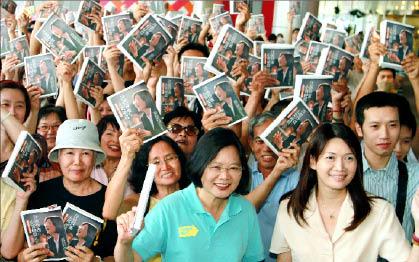Democratic Progressive Party (DPP) Chairperson Tsai Ing-wen (蔡英文) holds a slight lead over President Ma Ying-jeou (馬英九) in both a head-to-head scenario and a possible three-way race, according to the latest survey, and Tsai would likely win the January presidential election if economic issues were voters’ top concern, analysts said in a forum yesterday.
A public opinion poll, conducted on Friday and Saturday by the Taiwan Brain Trust think tank, found that 35.9 percent of respondents would vote for Tsai, while 32.2 percent would vote for Ma and 13.7 percent would support People First Party Chairperson James Soong (宋楚瑜) in a three-way race.
Tsai also leads Ma with 40.1 percent versus 37.3 percent in a head-to-head battle, according to the survey.

Photo: Chang Chung-yi, Taipei Times
While Tsai’s campaign has been hurt by a series of allegations about her running mate Su Jia-chyuan’s (蘇嘉全) farmhouse in Pingtung County, it appeared she had more than made up for it during her 11-day campaign trip on the west coast, said Chen Jin-ji (陳錦稷), director of the Taiwan Brain Trust’s poll center, adding that Ma’s re-election campaign has suffered devastating blows because of his peace agreement proposal.
Tsai enjoys a large lead in southern Taiwan in a head-to-head battle, leading Ma by 17.9 percentage points in Yunlin, Chiayi and Greater Tainan, and 27.2 percentage points in Greater Kaohsiung and Pingtung, the survey showed.
She also holds the advantage among voters in the 20-39 age group, with a 15.4 point lead in the 20-29 age bracket, and leads by 7.6 points in the 30-39 bracket.
Despite Tsai trailing among female voters by 3.6 percentage points, the poll result is the best ever performance for any DPP presidential candidate, Taiwan Brain Trust chief executive Lo Chih-cheng (羅致政) said.
Economic voting behavior was one of the most crucial reasons contributing to the DPP’s landslide loss in the 2008 presidential election, as financially challenged voters tend to favor a change in government, said Kenneth Lin (林向愷), an economics professor at National Taiwan University.
If that theory applies in the upcoming election, Lin said, the same things could happen again because most of the respondents were not happy with the economic performance of the Ma administration and said they were pessimistic about Taiwan’s economic prospects.
The same survey found that more than half of the respondents are unhappy with Ma’s -performance on fighting the increasing wealth gap, unemployment and commodity prices, with 57.1 percent saying they were not satisfied with Ma’s economic performance and 56.9 percent saying Ma favored big business.
More than 70 percent of respondents described the nation’s unemployment situation as “serious” or “very serious” and 53.5 percent are concerned about losing jobs or being forced to take unpaid leave within the next six months.
“Countries around the world are suffering from economic downturns and turbulence. However, what concerns me the most is that, unlike other countries, expectations for the future have been lacking among Taiwanese,” Taiwan Brain Trust founder and former presidential adviser Koo Kwang-ming (辜寬敏) said.
That is why a regime change seems inevitable, he said, especially after Soong’s entry into the presidential election.
“From what I’ve seen, Ma has had no hope of being re-elected since Soong made his bid official,” Koo said.
The poll collected 1,071 samples with a 3 percent margin of error.

Alain Robert, known as the "French Spider-Man," praised Alex Honnold as exceptionally well-prepared after the US climber completed a free solo ascent of Taipei 101 yesterday. Robert said Honnold's ascent of the 508m-tall skyscraper in just more than one-and-a-half hours without using safety ropes or equipment was a remarkable achievement. "This is my life," he said in an interview conducted in French, adding that he liked the feeling of being "on the edge of danger." The 63-year-old Frenchman climbed Taipei 101 using ropes in December 2004, taking about four hours to reach the top. On a one-to-10 scale of difficulty, Robert said Taipei 101

Nipah virus infection is to be officially listed as a category 5 notifiable infectious disease in Taiwan in March, while clinical treatment guidelines are being formulated, the Centers for Disease Control (CDC) said yesterday. With Nipah infections being reported in other countries and considering its relatively high fatality rate, the centers on Jan. 16 announced that it would be listed as a notifiable infectious disease to bolster the nation’s systematic early warning system and increase public awareness, the CDC said. Bangladesh reported four fatal cases last year in separate districts, with three linked to raw date palm sap consumption, CDC Epidemic Intelligence

Two Taiwanese prosecutors were questioned by Chinese security personnel at their hotel during a trip to China’s Henan Province this month, the Mainland Affairs Council (MAC) said yesterday. The officers had personal information on the prosecutors, including “when they were assigned to their posts, their work locations and job titles,” MAC Deputy Minister and spokesman Liang Wen-chieh (梁文傑) said. On top of asking about their agencies and positions, the officers also questioned the prosecutors about the Cross-Strait Joint Crime-Fighting and Judicial Mutual Assistance Agreement, a pact that serves as the framework for Taiwan-China cooperation on combating crime and providing judicial assistance, Liang

US climber Alex Honnold left Taiwan this morning a day after completing a free-solo ascent of Taipei 101, a feat that drew cheers from onlookers and gained widespread international attention. Honnold yesterday scaled the 101-story skyscraper without a rope or safety harness. The climb — the highest urban free-solo ascent ever attempted — took just more than 90 minutes and was streamed live on Netflix. It was covered by major international news outlets including CNN, the New York Times, the Guardian and the Wall Street Journal. As Honnold prepared to leave Taiwan today, he attracted a crowd when he and his wife, Sanni,